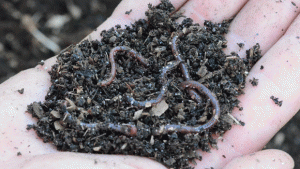The Fanelli Dairy has 750 cows that produce milk – and a far larger number of worms that turn out something else of value.
The farm is taking part in a research project using worms to consume nitrogen in manure-tainted water that irrigates its feed crops. The goal, in part, is to reduce the risk of pollution. But the process also has a byproduct – an especially rich fertilizer that can be sold to home gardeners and other users.
“They say this compost is pretty much worth a fortune,” said Vic Fanelli, a second-generation dairyman, as he lifted a shovelful of the stuff Thursday morning.
The federal Natural Resources Conservation Service provided a $483,950 grant for the project, taking place about 2 miles west of Hilmar. An equal amount has come from partners that include the dairy and Sustainable Conservation, a group based in San Francisco that helps businesses protect the environment.
Milk is among the top-grossing farm products in the Northern San Joaquin Valley and statewide, but with it comes a massive amount of manure. The common practice is to remove most of the solids and use the remaining wastewater to irrigate corn, oats and other feed. Nitrogen in the water is taken up by the crops, but too much could mean that nitrates leach down and contaminate the aquifer.
The worm system could help farmers comply with increased enforcement of rules by the State Water Resources Control Board, said Joe Choperena, senior project manager at Sustainable Conservation.
The project involves spraying the wastewater onto worms that live amid wood shavings in a concrete box 160 feet long and 35 feet wide.
“The water trickles down through the wood and the worms, and four hours later, it comes out of the tank,” Choperena said. “And in that four hours, 60 to 90 percent of the nitrogen is removed.”
The wastewater moves on to irrigate feed crops at the Washington Road farm. Back in the box, the worms have left their own manure, better known as castings, which are prized for home gardens, high-end vineyards and other uses.
Researchers are looking at the effects of the process on water, air and soil quality. They also are assessing the market for the castings, as well as worms sold for bait.
A quick online search suggests the potential: One purveyor in Rochester, N.Y., offers a 15-pound bag of castings for $29.95. That income could come in handy for dairy farmers, who have faced wild swings in milk prices in recent years.
The system is made by Biofiltro, a Chilean company with a branch in Fresno. About 130 of them operate at commercial scale around the world, but the Fanelli Dairy is the first in the United States, Choperena said. A small farm could install one for about $150,000, he said.
The federal money for the Fanelli project came from the Conservation Innovation Grant program at the NRCS. The early data on nitrogen removal by the worms looks promising, said Richard Cernansky, an agricultural engineer at the agency’s Fresno office.
“Our biggest driver for this type of technology is groundwater and surface water quality, and removing those nutrients is very important,” he said.
Dairy farmers could face pressure to acquire more cropland if the state tightens its standards for how much nitrogen can be spread per acre. The worm box reduces the nitrogen up front and does so with a tiny footprint on the land, Vic Fanelli said.
One other thing: Fanelli likes to fish, and he just might reach into his own worm box for bait.




One Response to Worms help with waste at Central Valley dairy – from the Modesto Bee